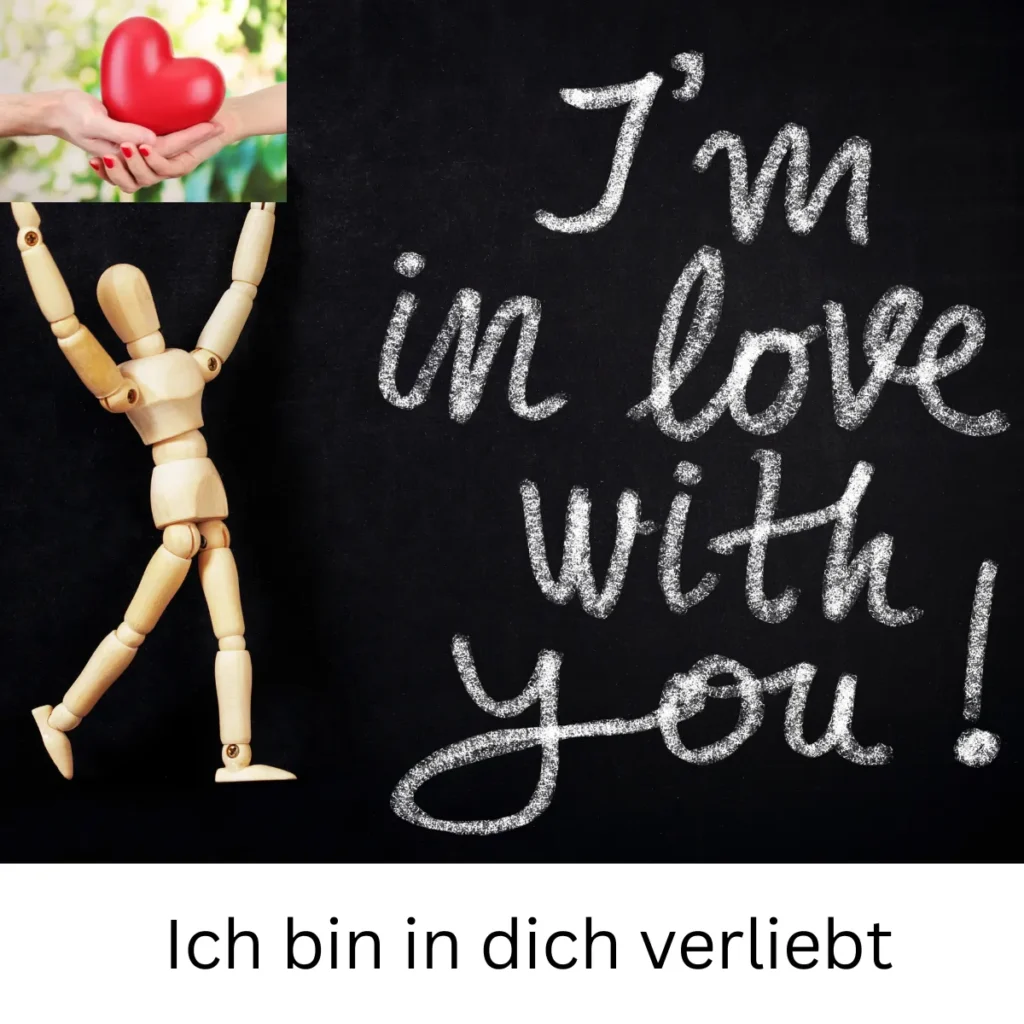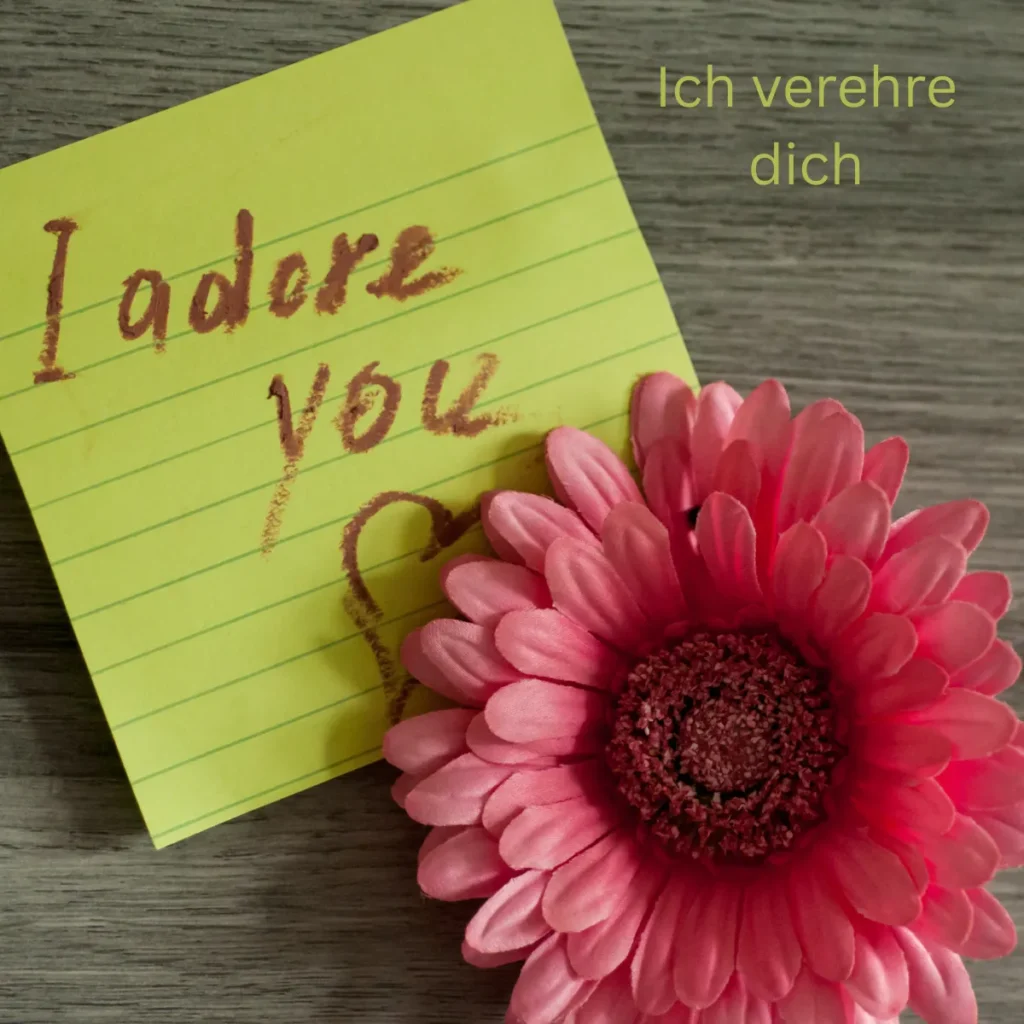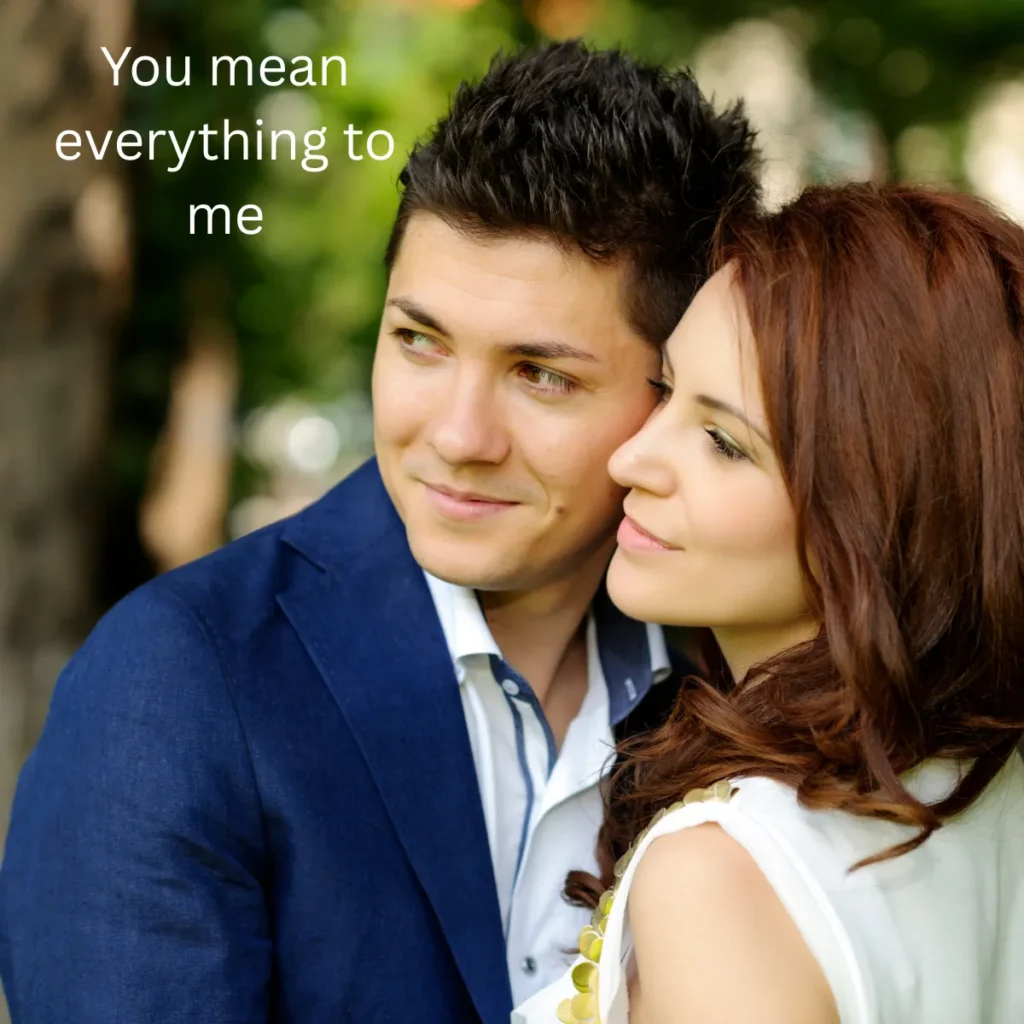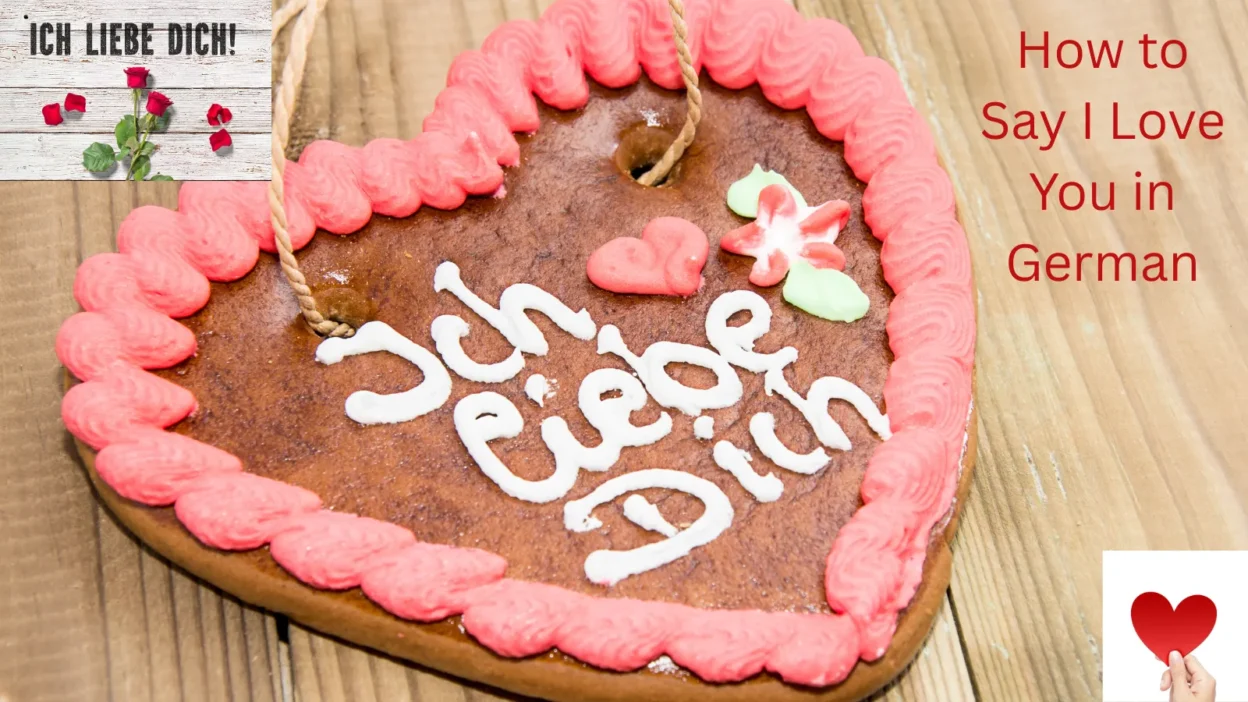How to Say I Love You in German is more than just learning a phrase—it’s about understanding the emotion and culture behind it. Whether you’re expressing deep feelings to a partner, showing affection to family, or simply practicing your German, knowing how to say I love you in different contexts can make your words more heartfelt.
In this guide, we’ll explore the most common and romantic ways to say I love you in German, along with their meanings and usage.
Say I Love You in German❤️
Here are 15 ways to say I love you in German with pronunciation, meaning, and context:
| German Phrase | Pronunciation | Meaning | Context |
|---|---|---|---|
| Ich liebe dich | ɪç ˈliːbə dɪç | I love you | Standard romantic expression |
| Ich hab’ dich lieb | ɪç hap dɪç liːb | I care about you / I love you | Slightly less intense, used for friends/family |
| Du bist mein Ein und Alles | du bɪst maɪn aɪn ʊnt ˈaləs | You are my everything | Deep romantic or emotional bond |
| Ich bin in dich verliebt | ɪç bɪn ɪn dɪç fɛɐ̯ˈliːpt | I’m in love with you | Confessing romantic love |
| Du bedeutest mir alles | du bəˈdɔʏtəst miːɐ̯ ˈaləs | You mean everything to me | Romantic or strong friendship |
| Ich verehre dich | ɪç fɛˈʔeːʁə dɪç | I adore you | Romantic, poetic tone |
| Ich mag dich sehr | ɪç maːk dɪç zeːɐ̯ | I like you a lot | Early stage of affection |
| Ich steh’ auf dich | ɪç ʃteː aʊf dɪç | I have a crush on you | Informal, flirty |
| Du bist mein Schatz | du bɪst maɪn ʃats | You are my treasure | Endearing nickname |
| Du bist mein Herz | du bɪst maɪn hɛʁts | You are my heart | Very affectionate |
| Ich will dich | ɪç vɪl dɪç | I want you | Romantic, passionate |
| Du bist die Liebe meines Lebens | du bɪst diː ˈliːbə ˈmaɪnəs ˈleːbəns | You are the love of my life | Deep, long-term love |
| Ohne dich kann ich nicht leben | ˈoːnə dɪç kan ɪç nɪçt ˈleːbən | I can’t live without you | Strong romantic attachment |
| Du fehlst mir | du feːlst miːɐ̯ | I miss you | Emotional longing |
| Ich bin verrückt nach dir | ɪç bɪn fɛˈʁʏkt naːx diːɐ̯ | I’m wild about you | Passionate, romantic or flirty |
Let’s explore 15 authentic ways to say I love you in German, complete with sample dialogues and cultural insights so you can speak from the heart—fluently.
1. Ich liebe dich (I love you)
Origin:
This is the standard and strongest form of expressing deep, romantic love in German. Use it only when you truly mean it.
Example:
👤 User A: Ich liebe dich, Anna.
👤 User B: Ich dich auch, Lukas.
Use: For serious, romantic love (partners, spouses).
2. Ich hab dich lieb (I have love for you)
Origin:
A softer, affectionate way to say you care deeply, often used in families or early relationships.
Example:
👤 User A: Ich hab dich lieb, Mama.
👤 User B: Ich dich auch, mein Schatz.
Use: For family, friends, or casual affection in relationships.
3. Ich bin in dich verliebt (I’m in love with you)

Origin:
This is used when someone has fallen in love and is ready to confess their feelings.
Example:
👤 User A: Ich muss dir etwas sagen… ich bin in dich verliebt.
👤 User B: Oh wow… ich auch in dich!
Use: Confessing love, especially early in a romantic relationship.
4. Du bist mein Ein und Alles (You are my everything)
Origin:
A poetic way of expressing that someone is your whole world.
Example:
👤 User A: Du bist mein Ein und Alles.
👤 User B: Und du bist mein Herz.
Use: Deep romantic love or poetic declarations.
5. Ich verehre dich (I adore you)

Origin:
Slightly old-fashioned and very respectful, this expression suggests admiration as well as love.
Example:
👤 User A: Ich verehre dich von ganzem Herzen.
👤 User B: Das ist so schön… danke!
Use: Romantic, formal, or respectful love.
6. Ich stehe auf dich (I have a crush on you)
Origin:
Slang for saying you’re attracted to someone. Popular among teens and young adults.
Example:
👤 User A: Also, ehrlich gesagt… ich stehe auf dich.
👤 User B: Echt? Ich auch auf dich!
Use: Casual, flirty crushes.
7. Du bedeutest mir alles (You mean everything to me)

Origin:
Used to show how important someone is in your life. Can be romantic or emotional.
Example:
👤 User A: Du bedeutest mir alles, weißt du das?
👤 User B: Und du mir auch.
Use: Romantic partners, deep friendships, or family.
8. Ich bin total vernarrt in dich (I’m totally out of control about you)
Origin:
Very expressive and playful. “Vernarrt” means infatuated or obsessed (in a sweet way).
Example:
👤 User A: Ich bin total vernarrt in dich!
👤 User B: Hihi, ich auch in dich!
Use: Lighthearted romantic moments.
9. Du bist mein Schatz (You are my treasure/sweetheart)
Origin:
“Schatz” is the most common German pet name for someone you love, like “honey” or “darling.”
Example:
👤 User A: Guten Morgen, mein Schatz!
👤 User B: Morgen, Liebling!
Use: Every day pet name for romantic partners or even kids.
10. Ich kann nicht ohne dich leben (I can’t live without you)
Origin:
This phrase expresses deep dependency or devotion and is often used in emotional conversations.
Example:
👤 User A: Ich kann nicht ohne dich leben…
👤 User B: Ich auch nicht ohne dich.
Use: Deep romantic connection, emotional moments.
11. Du bist mein Herz (You are my heart)
Origin:
A poetic, metaphorical way of saying someone is essential to your life.
Example:
👤 User A: Du bist mein Herz, wirklich.
👤 User B: Und du bist mein Leben.
Use: Romantic, poetic, or emotional confessions.
12. Ich will mein Leben mit dir verbringen (I want to spend my life with you)
Origin:
Used when proposing or declaring lifelong commitment.
Example:
👤 User A: Ich will mein Leben mit dir verbringen.
👤 User B: Und ich meines mit dir.
Use: Long-term romantic relationships, marriage proposals.
13. Ich bin dein / Ich gehöre dir (I am yours / I belong to you)
Origin:
Romantic and poetic expressions often found in love letters or songs.
Example:
👤 User A: Ich bin dein, für immer.
👤 User B: Und ich bin dein.
Use: Passionate and romantic declarations.
14. Ich liebe dich über alles (I love you more than anything)
Origin:
Used to express the highest level of devotion. The phrase adds extra weight to “Ich liebe dich.”
Example:
👤 User A: Ich liebe dich über alles.
👤 User B: Das bedeutet mir so viel.
Use: Romantic, deeply emotional love.
15. Ich bin verrückt nach dir (I’m out of control about you)
Origin:
Informal, flirty phrase—similar to “I’m wild about you.”
Example:
👤 User A: Ich bin verrückt nach dir, weißt du das?
👤 User B: Ich weiß – und ich bin’s auch!
Use: Playful romance or infatuation.
FAQs
1. What is the most common way to say “I love you” in German?
The most common phrase is “Ich liebe dich.” (Pronounced: ikh lee-buh deekh)
2. Is “Ich liebe dich” romantic?
Yes. It is used mainly for romantic partners, like a boyfriend, girlfriend, husband, or wife.
3. How do I say “I like you” in German?
Say “Ich mag dich.” This is less strong than “I love you.”
4. How do I say “I really love you” in German?
You can say “Ich liebe dich so sehr.” (I love you so much.)
5. How do I say “I love you too” in German?
Say “Ich liebe dich auch.”
6. How do I say “I love you, my love” in German?
Say “Ich liebe dich, meine Liebe” (to a female) or
“Ich liebe dich, mein Lieber” (to a male).
7. Is there a cute or playful way to say it?
Yes! You can say “Hab dich lieb.” It means I care deeply for you and is softer.
8. Can I use “Ich liebe dich” for family?
Usually no. Germans say “Hab dich lieb” to family members or close friends.
9. How do I write “I love you forever” in German?
Conclusion:
Learning how to say I love you in German opens the door to expressing your feelings with authenticity and cultural depth. Whether it’s “Ich liebe dich” for romance, “Ich hab’ dich lieb” for close friends and family, or other affectionate expressions, choosing the right phrase strengthens your emotional connection.
By understanding the meaning and context, your words will carry more warmth and sincerity.
Try them out and speak from the heart — or the Herz. ❤️🇩🇪



